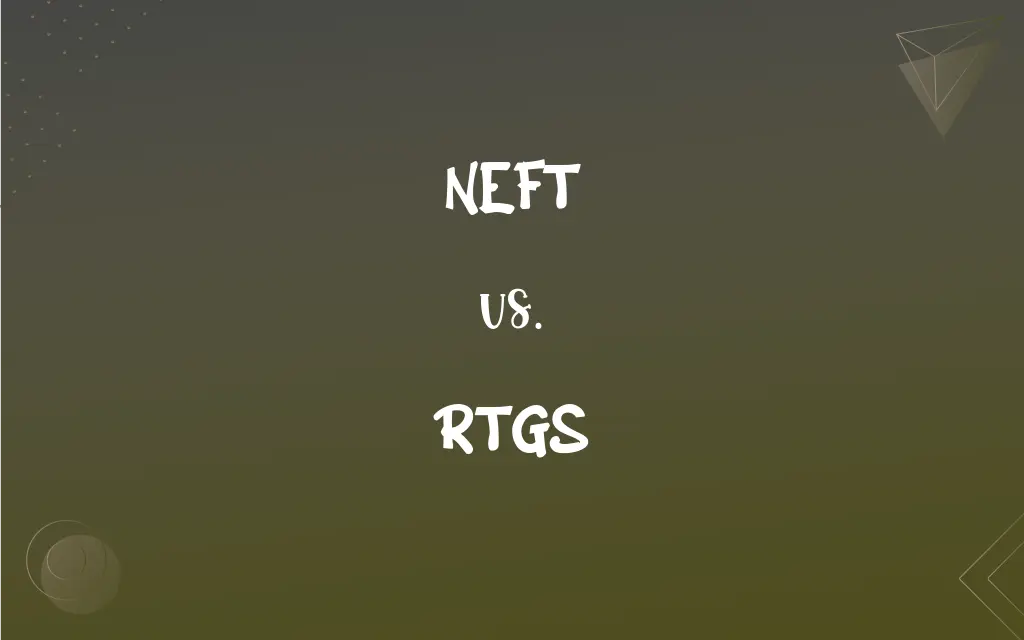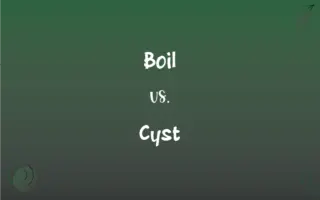NEFT vs. RTGS: What's the Difference?
Edited by Aimie Carlson || By Harlon Moss || Updated on October 17, 2023
NEFT (National Electronic Funds Transfer) is an electronic funds transfer system in India for batch settlements, while RTGS (Real-Time Gross Settlement) enables real-time large-value interbank transactions.

Key Differences
NEFT, or National Electronic Funds Transfer, is an electronic system used in India to transfer funds between banks. This system operates in batches and is not real-time. Conversely, RTGS, which stands for Real-Time Gross Settlement, is another funds transfer system that operates in real-time and is primarily designed for large-value transactions.
When utilizing NEFT, transactions are processed in hourly batches, meaning that there can be a delay in funds reaching the recipient's bank. On the flip side, RTGS transactions are processed instantly, ensuring that the recipient receives the transferred amount in real-time, provided the transaction is conducted within the operational hours.
From a monetary perspective, NEFT doesn't usually have a minimum transfer limit, making it suitable for small transfers. RTGS, due to its real-time nature, generally has a minimum transaction limit, positioning it as a preferable option for transferring substantial amounts of money.
In terms of accessibility, both NEFT and RTGS are widely available across banks in India. However, it's crucial to note that while NEFT can be used for all account types, including savings, current, and cash credit, RTGS is mainly reserved for current account holders in many banks.
The charges associated with NEFT and RTGS transactions can vary. Typically, NEFT charges are lower due to its batch processing nature. In contrast, RTGS, being a real-time service, can come with a higher fee, especially for high-value transactions.
ADVERTISEMENT
Comparison Chart
Nature
Batch-based settlement
Real-time settlement
Transaction Time
Processed in hourly batches
Instant
Minimum Transfer Limit
Usually no minimum limit
Has a minimum limit (e.g., 2 lakhs in India)
Usage
Suitable for small to medium transfers
Primarily for large-value transactions
Fees
Typically lower
Generally higher, varies with transaction value
ADVERTISEMENT
NEFT and RTGS Definitions
NEFT
A widely accessible banking transfer method in India operating in fixed time slots.
I missed the 10 am NEFT batch, so my transfer will be processed in the next one.
RTGS
A real-time interbank transfer system for high-value transactions.
For a 5 million rupee transfer, I'd use RTGS.
NEFT
A digital payment system allowing transfer without any minimum limit.
Even for transferring just 500 rupees, I can use NEFT.
RTGS
An electronic fund transfer mechanism that operates instantly.
The advantage of RTGS is the immediate settlement.
NEFT
A mode of interbank transfer for smaller and medium-sized transactions.
For small amounts, NEFT is more cost-effective.
RTGS
A secure and fast method for transferring large sums between banks.
For urgent, high-value transactions, RTGS is the go-to.
NEFT
An electronic fund transfer system in India operating in hourly batches.
I sent money using NEFT and it got credited in the next batch.
RTGS
An Indian banking solution primarily for substantial financial transfers.
Businesses often prefer RTGS for bulk transactions.
NEFT
An Indian banking system for electronic monetary transfers.
Using NEFT, I can send money to any bank account in India.
RTGS
A digital transfer system requiring a minimum amount for transactions.
I couldn't use RTGS as my transfer amount was below the threshold.
FAQs
What's the primary purpose of RTGS?
RTGS is primarily for instant, high-value interbank transfers.
How is RTGS different from NEFT?
RTGS is a real-time transfer system for large amounts, while NEFT operates in hourly batches for any amount.
Can I use NEFT for any bank in India?
Yes, NEFT is accessible across all major banks in India.
What does NEFT stand for?
NEFT stands for National Electronic Funds Transfer.
Is there a minimum amount for NEFT transactions?
Usually, there's no minimum amount for NEFT transactions.
What information is needed for a NEFT transfer?
For NEFT, you typically need the recipient's name, bank details, account number, and IFSC code.
Can I cancel an RTGS transaction once initiated?
Once an RTGS transaction is processed, it's final and typically cannot be canceled.
Can I use RTGS for international transfers?
No, RTGS is for domestic interbank transactions within India.
Are there any disadvantages to using NEFT?
NEFT operates in batches, so it might not be as fast as real-time systems like RTGS.
Can I schedule future-dated NEFT transactions?
Yes, many banks allow you to schedule NEFT transactions for future dates.
Why would someone choose NEFT over RTGS?
NEFT is often chosen for smaller amounts due to lower fees and no minimum limit.
How long does a NEFT transfer take?
NEFT transfers are processed in hourly batches, so the time can vary.
Can businesses use RTGS for their transactions?
Absolutely, businesses often use RTGS for high-value transactions.
Is there a maximum limit for RTGS transactions?
There's no maximum limit for RTGS, but there's a minimum limit, often set by the bank.
Is RTGS available 24/7?
As of my last update in 2022, RTGS in India operates 24/7.
Are there charges for using NEFT or RTGS?
Yes, banks typically charge a fee for both NEFT and RTGS, but the rates can vary.
Can individuals use RTGS?
Yes, individuals can use RTGS for transferring large amounts.
How do I know if a bank offers NEFT or RTGS services?
Most major banks in India offer both NEFT and RTGS services. It's best to check with the specific bank.
Which is faster, NEFT or RTGS?
RTGS is faster as it's real-time, whereas NEFT works in batches.
Is RTGS secure?
Yes, RTGS is a secure method managed by the central bank.
About Author
Written by
Harlon MossHarlon is a seasoned quality moderator and accomplished content writer for Difference Wiki. An alumnus of the prestigious University of California, he earned his degree in Computer Science. Leveraging his academic background, Harlon brings a meticulous and informed perspective to his work, ensuring content accuracy and excellence.
Edited by
Aimie CarlsonAimie Carlson, holding a master's degree in English literature, is a fervent English language enthusiast. She lends her writing talents to Difference Wiki, a prominent website that specializes in comparisons, offering readers insightful analyses that both captivate and inform.































































